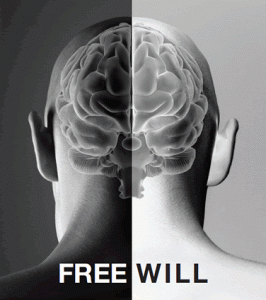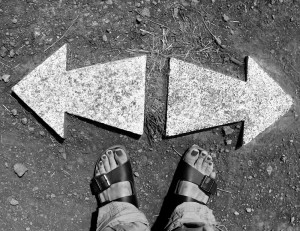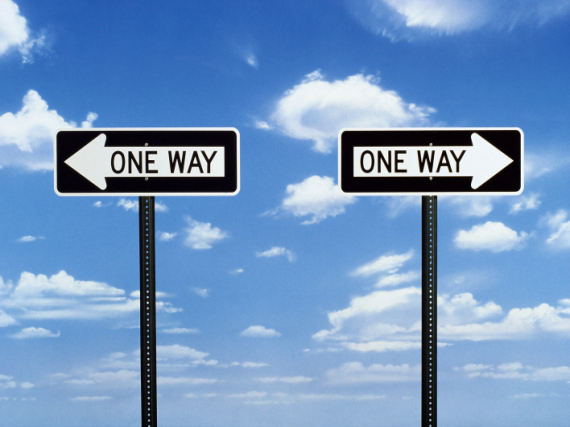At nearly 1000 meters, the reservoir is seasonally about two weeks ahead of the Valley, and the first colors of autumn have appeared. Even at mid-afternoon, the air is chilly.
 After the hot, rainless summer months, and water depletion by the mountain communities nearby, the reservoir is down by about half. The sky is mostly clear, but there are a few white and gray cumulus clouds, which hover like celestial islands over the pines.
After the hot, rainless summer months, and water depletion by the mountain communities nearby, the reservoir is down by about half. The sky is mostly clear, but there are a few white and gray cumulus clouds, which hover like celestial islands over the pines.
As the sun descends toward the treetops, the wind dies down completely, and an astounding quiet descends over the land and water. The water, which was gently lapping the shore, grows dead calm, and the brilliant sun reflects off the lake with a doubling effect.
Attuned to the place after half an hour of listening and watching, the sound of a large, unseen bird is heard from some distance away, each down-stroke of its wings sharply beating the air.
With the stillness of thought, I’m again struck by how this little man-made lake is a cosmic antenna, receiving, for the attentively quiet brain, the background sacredness of universe.
At the root of the problem of ‘free will’ are two seemingly irreconcilable facts: first, the idea that the will can be free; second, the fact that the universe is governed by cause and effect (that is, deterministically).
Since humans are not separate, special creations, but inextricably part of the universe, we are governed by cause and effect. Does that mean there is no such thing as freedom?
No, it means the will can never be free, and the independent chooser is an illusion. One chooses and wills out of one’s conditioning, that is, the past, not out of some separate, supposedly ‘free’ thing called ‘me.’
conditioning, that is, the past, not out of some separate, supposedly ‘free’ thing called ‘me.’
Therefore ‘free will’ is an oxymoron. As the philosopher Schopenhauer said, “A man can do as he wills, but not will as he wills.”
So what is freedom?
There is another factor besides effort and will, one that provides a way out of the philosophical dilemma, as well as a way ahead for the human being in this wretchedly deterministic world. It is insight—the creative element in the cosmos.
The human capacity to be aware of and share in the ceaselessly creative force in the universe is what gives us our moral and ethical agency, and with it responsibility.
The universe was not created by some separate ‘Supreme Being,’ and set in motion with the Big Bang, but it is unendingly creative in its evolution. That creativity, potentially, can infuse and inform human life beyond the bounds of thought and knowledge.
Therefore we are not wholly determined by prior causes, biological or psychological.
There is no freedom with the self, only freedom from the self. That’s because when one acts from the self, one is acting from conditioning—familial, societal, and personal.
 Freedom is a state of being in which one is not acting from conditioning, but from insight and understanding. That implies a different kind of consciousness altogether.
Freedom is a state of being in which one is not acting from conditioning, but from insight and understanding. That implies a different kind of consciousness altogether.
Freedom is not the outcome of any kind of effort, but of undivided observation of the movement of thought and emotion, which allows sufficient attention to be gathered to end the movement of thought, at least temporarily.
What is the quality of being in which self and thought, ego and will, memory and association don’t rule? If these qualities define consciousness as we know it, what is the state of mind/brain that occurs with their negation?
Perhaps one can put it this way: Negating consciousness awakens awareness. Cognizance can mean both knowledge and awareness, but I’m referring to awareness that transcends knowledge, and in fact is unrelated to it. There is no duality, since the negation of consciousness as we know it awakens awareness beyond the known.
Since there is no separate self in actuality, the self is a construction and illusion of thought. We are unique individuals to the degree that we are without a separate self; that is, ‘not divided’ (which is the literal meaning of the word individual).
With self-knowing, each person is autonomous. Thus we are responsible for who and what we are, as well as for humanity as a whole.
In the end, what makes us morally responsible is not that we have ‘free will,’ but that we have the capacity to see beyond our conditioning, and act freely and creatively in the present.
Martin LeFevre

